 November 2022 in “IntechOpen eBooks”
November 2022 in “IntechOpen eBooks” Hair loss can significantly impact a person's mental health, causing issues like anxiety and depression, and stress can trigger hair loss.
 October 2022 in “Pediatric Dermatology”
October 2022 in “Pediatric Dermatology” Most children with rapid hair loss had a known cause, with stress and illness being top triggers, and treatments showed similar improvement.
 August 2022 in “Metabolites”
August 2022 in “Metabolites” Different types of skin on mice have unique chemical profiles related to how they grow and react to stress.
 June 2022 in “Journal of the turkish academy of dermatology”
June 2022 in “Journal of the turkish academy of dermatology” The COVID-19 quarantine in Turkey disrupted dermatological care, increased stress-related skin issues, and showed the need for psychological support and teledermatology.
May 2022 in “Brazilian Journal of Health Review” COVID-19 infection can cause temporary hair loss due to stress, treatment drugs, psychological impact, and pandemic-related stress.
November 2021 in “Медицинский алфавит” COVID-19 can cause temporary hair loss due to stress and inflammation.
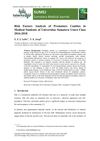 January 2020 in “Sumatera Medical Journal”
January 2020 in “Sumatera Medical Journal” Family history and stress are linked to early hair graying, with family history being the main factor.
 January 2020 in “Archives of Medicine and Health Sciences”
January 2020 in “Archives of Medicine and Health Sciences” Certain immune molecules and stress affect hair loss, and while genes play a role, more research is needed to fully understand and treat it.
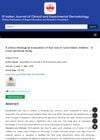 July 2018 in “IP Indian journal of clinical and experimental dermatology”
July 2018 in “IP Indian journal of clinical and experimental dermatology” Hair loss in rural Indian children is often due to malnutrition, poor grooming, stress, and infections.
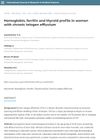 January 2016 in “International Journal of Research in Medical Sciences”
January 2016 in “International Journal of Research in Medical Sciences” Low iron, low thyroid function, and stress are linked to excessive hair shedding in women.
 January 2014 in “International Journal of Athletic Therapy and training”
January 2014 in “International Journal of Athletic Therapy and training” A female runner's hair loss was caused by stress from surgery and recovery, but her hair returned to normal in 5 months.
 January 2009 in “대한피부과학회지”
January 2009 in “대한피부과학회지” The conclusion is that more women in their forties are getting AGA and stress is linked to AGA in both men and women.
 October 2005 in “CRC Press eBooks”
October 2005 in “CRC Press eBooks” Telogen effluvium is a condition where hair falls out due to various factors like illness, stress, or nutrient deficiency.
January 2005 in “한방재활의학과학회지” Most alopecia patients were young adults with oily scalps, often linked to stress and family history.
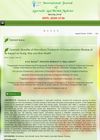 December 2024 in “International Journal Of Ayurvedic And Herbal Medicine”
December 2024 in “International Journal Of Ayurvedic And Herbal Medicine” Shirodhara improves scalp health, hair growth, and skin appearance by reducing stress and enhancing circulation.
 September 2024 in “Journal Of Social Sciences And Humanites”
September 2024 in “Journal Of Social Sciences And Humanites” A combined approach of medical treatments, natural remedies, diet, and stress management is best for hair regrowth in Cambodia.

Ganoderma lucidum extract may help treat stress-related hair loss.
 March 2024 in “Korean Journal of Pharmacognosy”
March 2024 in “Korean Journal of Pharmacognosy” Nymphaea caerulea flower extract can improve scalp conditions by reducing oil, inflammation, stress hormones, and blood vessel issues.
 February 2024 in “Biomedicines”
February 2024 in “Biomedicines” Hormones like androgens, estrogen, thyroid hormones, and stress hormones can contribute to hair loss, and treatments target these hormonal imbalances.
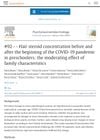 February 2024 in “Psychoneuroendocrinology”
February 2024 in “Psychoneuroendocrinology” The COVID-19 pandemic did not significantly change stress levels in preschoolers, but higher-income families' children showed higher stress.
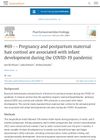 February 2024 in “Psychoneuroendocrinology”
February 2024 in “Psychoneuroendocrinology” Mothers with lower stress during pregnancy but higher stress after birth had infants with lower development scores.
 April 2023 in “Journal of Investigative Dermatology”
April 2023 in “Journal of Investigative Dermatology” Ganoderma lucidum extract can potentially reduce stress-induced hair loss by slowing down premature hair aging and removing harmful substances.
 December 2022 in “Exploratory animal and medical research”
December 2022 in “Exploratory animal and medical research” The study concluded that Acral lick dermatitis is most common in young male Labrador retrievers, often caused by psychological factors, and leads to skin inflammation and stress-related blood changes.
 November 2022 in “Journal of Investigative Dermatology”
November 2022 in “Journal of Investigative Dermatology” Aging skin cells change their lipid profiles due to stress, affecting skin health.
 March 2022 in “Brazilian Journal of Health Review”
March 2022 in “Brazilian Journal of Health Review” COVID-19 can cause a type of hair loss that usually starts 3-6 months after the illness, and treatment includes stress reduction and hair care products like Minoxidil.
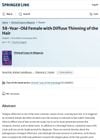 January 2022 in “Clinical Cases in Dermatology”
January 2022 in “Clinical Cases in Dermatology” Stress can cause temporary hair loss, which usually gets better after the stress is gone.
 January 2022 in “Figshare”
January 2022 in “Figshare” Dexamethasone increases androgen receptor activity in scalp cells, which might explain stress-related hair loss.
 September 2021 in “Journal of skin and stem cell”
September 2021 in “Journal of skin and stem cell” Lactium, a milk protein, can help reduce symptoms of skin disorders linked to stress and anxiety without side effects.
September 2021 in “Yearbook of pediatric endocrinology” Stress hormone stops a growth signal and keeps hair stem cells inactive, reducing hair growth.
September 2021 in “Psychoneuroendocrinology” Nurses had higher stress levels during intense phases of the COVID-19 pandemic.

























